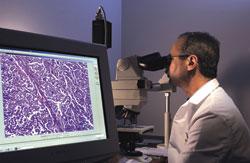


A genomic health scientist reviews a slide
to ensure the tissue sample is suitable.
NCI is not content to only understand the biology of cancer. NCI researchers are working tirelessly to find novel cancer treatments that do not harm healthy tissue, particularly for those types of cancer that are not being addressed by the private sector. We seek to find and evaluate such therapies, and then to develop collaborations with the private sector that will ensure that the therapies progress quickly to regulatory approval and clinical practice. To facilitate application, the NCI-designated Cancer Center Directors' report recommends enhanced collaborations among national organizations such as Centers for Disease Control and Prevention, Centers for Medicare and Medicaid Services, Health Resources and Services Administration, and Agency for Healthcare Research and Quality as key to successful dissemination of best practices for cancer care to reduce treatment heterogeneity or suboptimal care.
At the heart of NCI's internal efforts to find and develop new cancer drugs is the NCI's Developmental Th erapeutics Program (DTP). In keeping with its goal to turn molecules into medicine for the public health, DTP, created by Congress in 1955 as the Cancer Chemotherapy National Service Center, serves as a vital resource in acquiring preclinical information and providing research materials, including vialed and plated compounds, tumor cells, animals, and bulk drugs for investigational new drug (IND)-directed studies. DTP has been involved in the discovery or development of more than 70 percent of the anticancer therapeutics on the market today. Successes include paclitaxel (Taxol®), one of the most widely prescribed anticancer drugs on the market, and bortezomib (Velcade®).
The Trial Assigning IndividuaLized Options for Treatment (Rx), or TAILORx, was launched in May, 2006. Currently, the majority of women with early-stage breast cancer are advised to receive chemotherapy in addition to radiation and hormonal therapy, yet research has not demonstrated that chemotherapy benefits all of them equally. TAILORx seeks to incorporate a molecular profiling test into clinical decision making, and thus spare women unnecessary treatment if chemotherapy is not likely to be of substantial benefit. TAILORx is one of the first trials to examine a methodology for personalizing cancer treatment, and will ultimately enroll over 10,000 women at 900 sites in the United States and Canada. TAILORx is sponsored by the NCI, and is coordinated by the Eastern Cooperative Oncology Group (ECOG).
Paclitaxel, a natural product, was first harvested by researchers working under a joint U.S. Department of Agriculture-NCI grant. It was a DTP contractor who formulated the drug for use in clinical trials.
In cooperation with the commercial sponsor, bortezomib was screened and formulated by DTP. Approved by the FDA in 2003, it remains the first treatment in more than a decade to be approved for patients with multiple myeloma.
Although many academic and private-industry laboratories also are focused on drug discovery, NCI sees an opportunity to mediate novel academic-industry partnerships to overcome financial and technical barriers that may keep promising therapeutics from reaching patients. For example, a new direction for therapeutic drug development, made possible by the FDA Exploratory IND Guidance, is the Phase 0 clinical trial. These early studies are designed to determine if a drug shows favorable biodistribution, mechanisms of action and/or binding characteristics. These determinations are made in a limited number of patients using microdoses of the drug under investigation enabling "go, no-go" decisions earlier in the drug development process. NCI is developing these protocols, in many cases with industry partners, expediting the development and testing of promising therapeutics for cancer.
| Year | Drug Developed |
|---|---|
| 2004 | Erbitux® (NSC 632307) |
| 2003 | Velcade® (NSC 681239) |
| 1998 | Ontak® (NSC 697979) |
| 1996 | Gliadel® (NSC 714372) Topotecan (NSC 609699) |
| 1995 | All-t-retinoic acid (NSC 122758) |
| 1992 | Chorodeoxyadenosine (NSC 105014) Taxol® (NSC 125973) Teniposide (NSC 122819) |
| 1991 | Fludarabine Phosphate (NSC 312887) Pentostatin (NSC 218321) |
| 1990 | Hexamethylmelamine (NSC 13875) Levamisole (NSC 177023) |
| 1989 | Carboplatin (NSC 241240) |
| 1988 | Ifosfamide (NSC 109724) |
| 1987 | Mitoxantrone (NSC 301739) |
| 1983 | Etoposide (NSC 141540) |
| 1982 | Streptozotocin (NSC 85998) |
| 1979 | Daunorubicin (NSC 82151) |
| 1978 | cis-Platinum (NSC 119875) |
| 1977 | BCNU (NSC 409962) |
| 1976 | CCNU (NSC 9037) |
| 1975 | Dacarbazine (NSC 45388) |
| 1974 | Doxorubicin (NSC 123127) Mitomycin C (NSC 26980) |
| 1973 | Bleomycin (NSC 125066) |
| 1970 | FUDR (NSC 27640) Mithramycin (NSC 24559) o-p'-DDD (NSC 38721) |
| 1969 | Ara-C (NSC 63878) Procarbazine (NSC 77213) |
| 1967 | Hydroxyurea (NSC 32065) |
| 1966 | Pipobroman (NSC 25154) Thioguanine (NSC 752) |
| 1964 | Melphalan (NSC 8806) Actinomycin D (NSC 3053) |
| 1963 | Vincristine (NSC 67574) |
| 1962 | Fluorouracil (NSC 19893) |
| 1961 | Vinblastine (NSC 49842) |
| 1959 | Cyclophosphamide (NSC 26271) Thiotepa (NSC 6396) |
| 1957 | Chlorambucil (NSC 3088) |